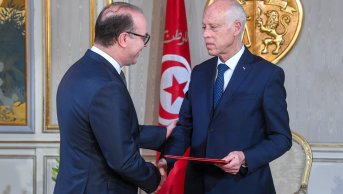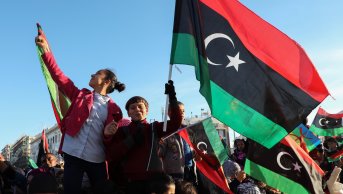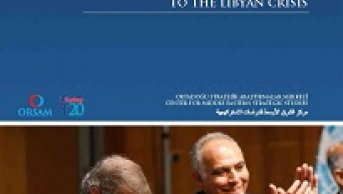Is Peace Possible in Libya?

The ongoing bloody and difficult struggle between two parliaments, two governments, and militia forces has been dragged towards a dramatic turning point. Under the current circumstances, considering the balance of power among these forces, it is obvious that the defeated side is going to be Libyans and Libya’s future in the conflict which the sides cannot defeat each other. In addition, the ongoing conflict empowers warlords and radicalism, and thus complicates the problems, which have already been hard to resolve.
The conflicts between the parties has been expedited, condensed and regionally scattered since the summer of 2014. Especially, strategically important airports, oil pipelines, roads, harbors and city centers have become targets of air attacks as well as battle fields. Also, condensing conflicts increase the rate of civil causalities every passing day. In addition to this, these conflicts destroy country’s infrastructures that are necessary for civilians to continue their daily lives. Although the estimates of civilian casualties vary greatly according to the sources, the given figures range between 1,000 and 2,500. Furthermore, the number of the displaced Libyans has risen from 100,000 to 400,000 after the recent clashes. It is claimed that ISIS has controlled the centre of Benghazi, Derna and Sirte and even gained ground in several other cities especially in Tripoli. Tragic news about boats full of refugees outbound from Libyan ports is increasing with each passing day. As of 2011, it is reported that approximately 10,000 refugees have died in deadly incidents in the Mediterranean Sea. This general picture has reached an alarming level with Egypt’s air operations in Libya and call for UN Security Council for an international military intervention to Libya. Parallel to these developments in Libya, the United Nations Support Mission in Libya (UNSMIL) stepped up the negotiation process which has been brokered since September 2014 for reconciling the parties in Libya. However, is it possible to end the civil war, fragmentation and the ongoing bloody clashes between militia forces with a political compromise between House of Representatives (HoR) in Tobruk and General National Congress (GNC) in Tripoli? Especially when considered is the fact that both governments do not have firm sovereignty over their own alliance blocs as well as the areas they are located in.
The UN peace talks, brokered by Special Representative of the Secretary-General for Libya, Bernardino León, began in Ghadames, a southern town in Libya on 29 September 2014. However, GNC was not invited to Ghadames talks, and the participation was limited to HoR members and 40 deputies who boycotted HoR. Despite this limited participation, the talks deadlocked and could not be obtained a positive outcome. Thereupon, León decided to move the talks to Geneva and expand the scope of the participants. Both two governments and parliaments, representatives of city councils and militia forces were invited to the talks in Geneva held on 15 January 2015. GNC in Tripoli announced that they rejected to participate in the talks in Geneva. However, some members of GNC and representatives of Misrata city council acted against this boycott decision and participated in the talks. Notwithstanding the participants of Geneva talks were accused as 'traitors' due to not obeying GNC’s boycott decision; by doing so, their participation prevented GNC’s total isolation from Geneva talks. GNC, leaving aside its initial attitude, announced that they may participate to the talks if the negotiations would continue in Libya. Inability to obtain a positive result after two rounds of talks in Geneva, the lack of willingness of the parties to compromise and the intensification of the clashes during the rounds of talks blocked the Geneva talks. As a result of GNC’s demands as well as the deadlock in Geneva talks, UN has decided to resume negotiations in Libya, but then due to 3 suicide attacks in Kubbe town of Derna, located in 250 kilometres east of Benghazi which resulted in 47 people’s death, UN moved the talks to Morocco. León aimed to increase the success chance of the talks with the active participation and support of regional actors by moving the talks to Morocco, Skhirate in March 2015.
Following the first round of proximity talks held between 12 Mach and 26 March 2015, the parties started the second round of the talks on 15 April 2015 and began to negotiate framework notes of the Libyan Political Agreement draft. Meanwhile, the raid to Tripoli, organized by the forces loyal to Khalifa Haftar, who supported HoR, led to the interruption risk of the talks in April, 2015 during the second round of the talks. On 16 April, despite that the GNC suspend its participation to the proximity talks, the second round also completed. In all these rounds, UN has three main objectives. These objectives are the establishment of a government of national accord, the ceasefire agreement between the parties, the formation of Libyan national army with the withdrawal of armed forces, the militias, from the cities. In this context, following the four-round talks, which started in Geneva and continued in Morocco, Skhirate; UNSMIL presented a draft to the parties at the end of April. The first title of this draft agreement involves the formation a government of national accord as well as the A Presidency Council for the Council of Ministers. The second title states that the parties will accept HoR in Tobruk as the legitimate legislative body, which constitute the whole Libyans. The third title includes the formation of the High Council of State, co9mstitution drafting committee, national security council, and municipal councils. On 28 April, GNC in Tripoli announced that they rejected the draft agreement offered by the UN, while HoR in Tobruk declared that they would accept the draft. León, by saying that international society expects the parties to reach an agreement in Libya until the beginning of Ramadan month, 17 June, gave GNC the message of reviewing their decision. Consequently, the process deadlocked once again.
The peace talks currently conducted by the UN between the parties to end the conflict in Libya are very valuable on behalf of a political solution in Libya. But is it possible to resolve the conflict or reach a roadmap for the resolution via the talks conducted by UN in the context of the course of the talks? UN has been managing a fairly decisive process on behalf of the political solution in Libya. This determination may possibly contribute to the continuation of the process that was blocked or reconciliation between the parties in the context of a road map. However, a set of defective assumptions of UN decreased the possible success of the process to considerably lower rates.
First of all, UN seems to be convinced that the legitimate political interlocutor, in a political resolution, should be HoR in Tobruk. Likewise, the second title of the draft agreement is the announcement of this conviction. The most important factor shaping the conviction of UN in this direction is the assumption that compared to the GNC in Tripoli, HoR in Tobruk, which has the support of forces loyal to Haftar, military units of Barqa federalist regional government led by Ibrahim Judhran, and Libyan Air Forces, is more advantageous. From this point of view, HoR in Tobruk reflects militarily more powerful and capable image, however, on the contrary to this image and assumptions, but cannot provide the expected success in the field. HoR in Tobruk, despite its military advantages, could not expand so much its area domain with the operations carried out since 2014. Despite all efforts, which also later received serious amount of contributions from Egypt that carried out air strikes in Derna, HoR in Tobruk could not gain the control of the centre of Benghazi and Derna. As a result, the military forces of HoR are far from providing control of whole country, on the contrary to the UN's expectations.
At this point, another defective assumption of UN, attracts attention. According to UN, the recognition of HoR in Tobruk by GNC in Tripoli as well as reconciliation between two in the context of a political resolution will put an end to the military conflicts among militias and military forces. Yet, in this context, it would be possible to establish a national and integrated Libyan army with this national reconciliation between two parliaments and militia forces. These predictions are based on the assumption that the two parliaments have ultimate authority over all military and militia forces. However, neither GNC in Tripoli has total control over the militia forces, nor HoR in Tobruk has total control over the forces loyal to Haftar, military units of Barqa federalist regional government led by Ibrahim Judhran, or Libyan Air Forces. Both the Libyan Dawn led by GNC in Tripoli and Karama Operation Alliance led by HoR in Tobruk are umbrella structures based on military and political alliance. Persuading the political elites for consensus is only a small part of the equation. The main part of the equation is to convince the militias and other forces for reconciliation process.
All these defective assumptions of UN arises from the reduction of the beginning of the crisis in Libya to the general elections held in summer of 2014, and therefore, does not comply with the facts on the ground. The conflict in Libya has rooted from the unfinalized civil war that began in 2011 and the continuation of armament and power struggle as a result of the demise of the state in Libya, rather than political disputes or political elite defection. If UN had had conducted this process by giving support to state formation in 2011 and 2012, they could have obtained better results. However, today, efforts for resolving Libyan crisis through these defective assumptions will lead to the exhaustion of the prospects for a political solution and promoting military operations as an option in Libya.
This article was published in Ortadoğu Analiz journal with the title of "Is Peace Possible in Libya?”












